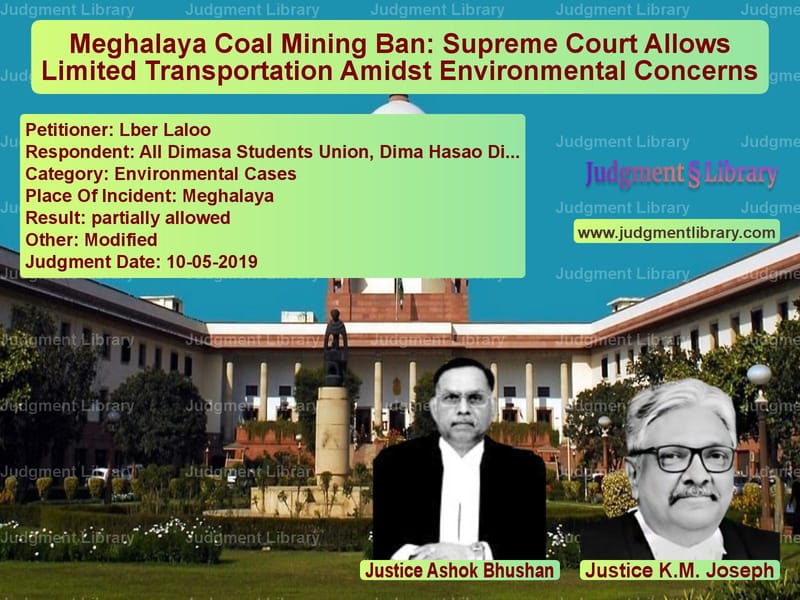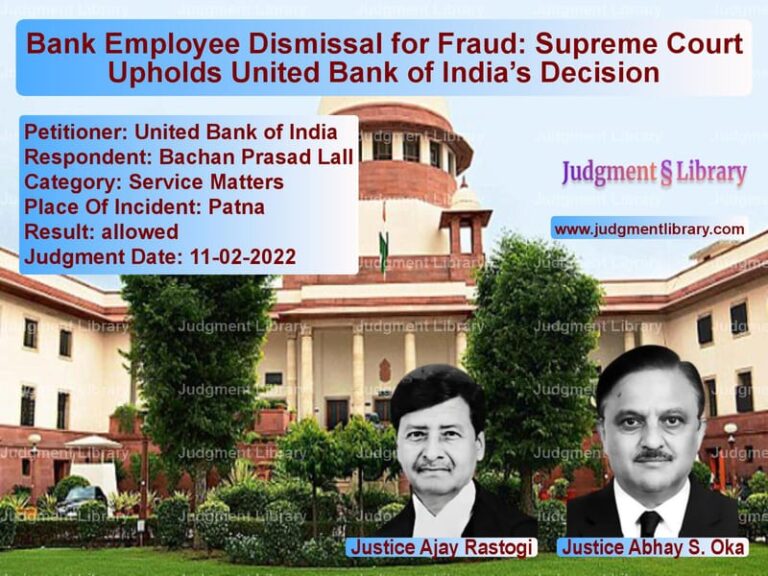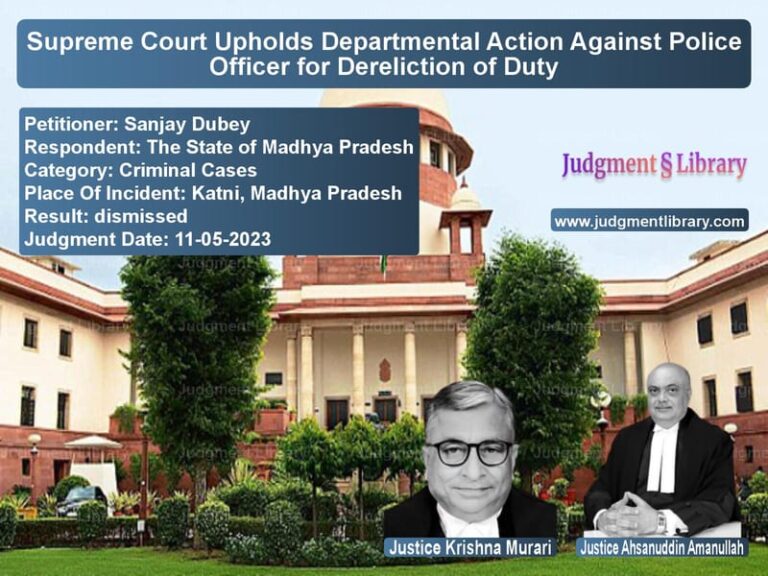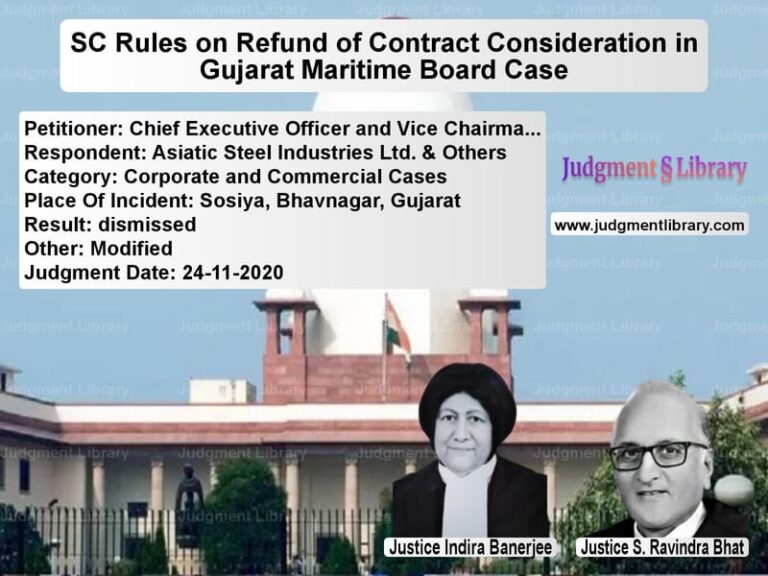Meghalaya Coal Mining Ban: Supreme Court Allows Limited Transportation Amidst Environmental Concerns
The case of Lber Laloo vs. All Dimasa Students Union, Dima Hasao District Committee & Ors. involves a significant environmental dispute over illegal coal mining in Meghalaya. The Supreme Court’s judgment primarily addresses the transportation of coal following the National Green Tribunal’s (NGT) ban on illegal rat-hole mining in the state. This ruling sets a crucial precedent on balancing environmental protection with economic interests.
The court permitted the transportation of a limited quantity of coal for which transport challans had already been issued before the ban took effect. However, it placed strict conditions to prevent further illegal mining. This decision underscores the judiciary’s role in enforcing environmental laws while accommodating stakeholders within legal limits.
Background of the Case
The dispute traces back to a 2014 suo moto case initiated by the Gauhati High Court after 15 laborers died in a mining accident in Meghalaya. The case was later transferred to the NGT, which imposed a blanket ban on rat-hole mining in the state, citing severe environmental damage and unsafe working conditions.
Following the ban, the Supreme Court was approached by various parties, including coal mine owners, traders, and environmental activists. The petitioners sought permission to transport coal that had already been mined before the ban, arguing that it was a matter of economic survival for many stakeholders in the state.
Petitioner’s Arguments
The appellants, primarily coal mine owners and traders, argued:
- The ban on coal mining had left a substantial quantity of extracted coal untransported, leading to financial losses.
- The coal had been legally mined before the ban, and its transportation should not be restricted.
- The state government had issued transport challans, validating the legality of the coal awaiting transportation.
- Prolonged storage of coal in open areas could lead to environmental hazards, particularly during the monsoon season.
- A proper mechanism could be set up to monitor and prevent fresh illegal mining while allowing transportation of legally extracted coal.
Respondent’s Arguments
The respondents, represented by the All Dimasa Students Union and environmental activists, countered:
- Illegal coal mining continued despite the NGT’s ban, and any permission for transportation would encourage further violations.
- The state government had failed to enforce the mining ban effectively, allowing illegal activities to persist.
- Transportation of coal could not be permitted unless a reliable verification mechanism was in place.
- Mining operations had caused severe environmental degradation, including water pollution and deforestation.
- The transportation of coal must be carefully regulated to ensure that only pre-ban coal was moved and no new illegal mining was conducted.
Supreme Court’s Analysis
The Supreme Court examined the competing interests of environmental protection and economic considerations. The key legal observations were:
- The court acknowledged the economic hardship faced by coal traders and mine owners due to the ban.
- At the same time, it emphasized the need to enforce environmental laws strictly to prevent further degradation.
- It recognized that allowing coal transportation without safeguards could lead to fresh illegal mining.
- The court directed the state of Meghalaya to establish a verification mechanism to ensure only previously mined coal was transported.
- The decision was limited to coal for which transport challans had been issued before the NGT’s order on January 15, 2019.
Key Judicial Findings
The Supreme Court ruled:
- Transportation of 75,050 metric tons of coal, for which transport challans had been issued before the ban, was allowed.
- The state government must finalize a mechanism for verification and monitoring before permitting transportation.
- A dedicated team of officers, not below the rank of Deputy Commissioner, must oversee the process.
- A complete record of coal transportation, including ownership details and verification certificates, must be maintained.
- No fresh mining would be permitted under the guise of transporting old coal.
- The transportation period was restricted from May 17, 2019, to May 31, 2019, after which no further transport would be allowed.
Conclusion and Impact
The Supreme Court’s ruling strikes a balance between economic interests and environmental protection. While it allows coal traders to transport legally mined coal, it enforces stringent safeguards to prevent illegal mining. The decision highlights the court’s commitment to sustainable development, ensuring that economic activities do not come at the cost of environmental degradation.
This judgment serves as a critical precedent in environmental litigation, reinforcing the principle that environmental concerns must take precedence over commercial interests unless carefully regulated.
Petitioner Name: Lber Laloo.Respondent Name: All Dimasa Students Union, Dima Hasao District Committee & Ors..Judgment By: Justice Ashok Bhushan, Justice K.M. Joseph.Place Of Incident: Meghalaya.Judgment Date: 10-05-2019.
Don’t miss out on the full details! Download the complete judgment in PDF format below and gain valuable insights instantly!
Download Judgment: Lber Laloo vs All Dimasa Students Supreme Court of India Judgment Dated 10-05-2019.pdf
Direct Downlaod Judgment: Direct downlaod this Judgment
See all petitions in Environmental Cases
See all petitions in Public Interest Litigation
See all petitions in Judgment by Ashok Bhushan
See all petitions in Judgment by K.M. Joseph
See all petitions in partially allowed
See all petitions in Modified
See all petitions in supreme court of India judgments May 2019
See all petitions in 2019 judgments
See all posts in Environmental Cases Category
See all allowed petitions in Environmental Cases Category
See all Dismissed petitions in Environmental Cases Category
See all partially allowed petitions in Environmental Cases Category







